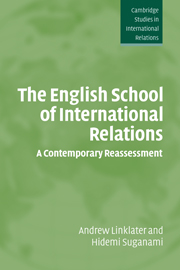Book contents
- Frontmatter
- Contents
- Acknowledgements
- Introduction
- 1 The idea of ‘the English School’ as a historical construct
- 2 The argument of the English School
- 3 The English School on ‘International Relations as an intellectual pursuit’
- 4 Progress and its limits: system, society and community in world politics
- 5 Cosmopolitanism and the harm principle in world politics
- 6 The sociology of states-systems
- 7 The good international citizen and the transformation of international society
- Conclusion
- Bibliography
- Index
- CAMBRIDGE STUDIES IN INTERNATIONAL RELATIONS
1 - The idea of ‘the English School’ as a historical construct
Published online by Cambridge University Press: 22 September 2009
- Frontmatter
- Contents
- Acknowledgements
- Introduction
- 1 The idea of ‘the English School’ as a historical construct
- 2 The argument of the English School
- 3 The English School on ‘International Relations as an intellectual pursuit’
- 4 Progress and its limits: system, society and community in world politics
- 5 Cosmopolitanism and the harm principle in world politics
- 6 The sociology of states-systems
- 7 The good international citizen and the transformation of international society
- Conclusion
- Bibliography
- Index
- CAMBRIDGE STUDIES IN INTERNATIONAL RELATIONS
Summary
The idea of the English School, or the view that such an entity exists, is now firmly established in the community of scholars specializing in International Relations across the world, especially since Barry Buzan's call, at the 1999 annual conference of the British International Studies Association, to ‘reconvene the English School’. This has resulted in a dramatic rise in the volume of conference papers and published works on a wide variety of themes associated with the School's key texts and its research agenda (Buzan, 2001; www.leeds.ac.uk/polis/englishschool/). But the idea of the English School is itself only about twenty years old. The purpose of this chapter is to trace the formation of this idea in the specialized academic discourse of International Relations. It is in this branch of knowledge that the idea can be said to find its home, even though the tradition of international thought which the School represents in broad outline is arguably as old as the Westphalian states-system itself.
The need to trace the emergence and evolution of the idea of the English School stems from the fact that, during the twenty years or so since the first reference was made to the School's presence (Jones, 1981), there has been some deep discrepancy, as well as convergence, among the chief commentators' views on the School's existence, identity and contributions.
- Type
- Chapter
- Information
- The English School of International RelationsA Contemporary Reassessment, pp. 12 - 42Publisher: Cambridge University PressPrint publication year: 2006

